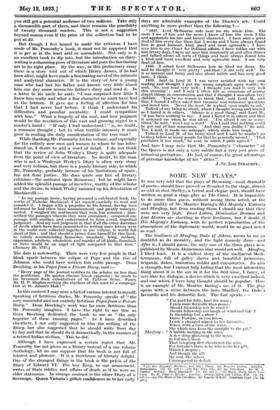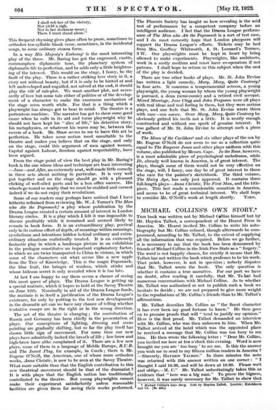SOME NEW PLAYS.*
IT was very odd that the plays of Browning—most dramatic of poets—should have proved so ilt-suited to the stage, almost as odd as that Shelley, a lyrical and elegiac poet, should have written so good a stage play as The Cenci. It is impossible to do more than guess, without seeing them acted, at the stage quality of Mr. Maurice Baring's His Majesty's Embassy and Manfroy, but from reading them I should say that they were not very high. Dead Letters, Diminutive Dramas and Lost Diaries are startling in their liveliness, but I doubt if His Majesty's Embassy, with its perfect reproduction of the atmosphere of the diplomatic world, would be as good acted as read.
The liveliness of Manfroy, Duke of Athens, seems to me as doubtful as its morality, and the light comedy June—and After is, I should guess, the only one of the three plays now published by Messrs. Heinemann that would act well. Manfroy I liked least. It is a violent story of .the mediaeval Medi- terranean, full of galley slaves and beautiful princesses, brigands, dukes, traitorous nobles and conspiracies. Its aim is strength, but I cannot help feeling that the most interesting thing about it is the use in it for the first time, I fancy, of vers Libre for dialogue, a device which is very excellent indeed, and one which I have long thought should be popular. Here is an example of Mr. Maurice Baring's use of it. The play opens with a scene between the hero Manfroy, the Duke's favourite and his domestic fool. The fool speaks :--
"I'm paid for folly, beat for sense ; I earn more fisticuffs than pence.
Should friendship not be tried ?
Should fellowship not laugh at wind and tide ?
Is friendship but a show ?
Dame Fortune, as you know, Lends a changed aspect to her favourite, When, with a turn of the wrist, She whirls him from the sunlight to the pit."
Manfroy : " A bubble melting in the mist,
A dew-drop glistening in the noon, Is fortune's boon.
That tempting dew cheats not the wise,
For fortune's slave is he who seeks her gift, Which I despise ; And though she sift My soul, like wheat.
Unconquered in defeat, • (1) His Majesty's Binkstuty, and 011a, r Plays. By Maurice Baring. London: Heinemann. [7s. 6d. net.]-(2) The Man who Ate Me Poponaek. By W. J. Turner. Oxford : Basil Blackwell. f3s. ticl. net.]—(3) Mary, Mary, Quite con- trary. By St. John G. Wyllie. London : George Allen and Unwin, Ltd. 13s. Bd. net.)—(4) The Moon of the Caribbees. By Eugene O'Neal. Jonathan Cape. Us. M. net.) I shall rob her of the victory, Nor yield a sigh, Nor In her darkness moan : There I must stand alone."
This frequent rhyming gives place often to prose, sometimes to orthodox ten-syllable blank verse, sometimes, in the incidental songs, to some ordinary stanza form.
In a way His Majesty's Embassy' is the most interesting play of the three. Mr. Baring has got the engrossed, exotic, commonplace diplomatic tone, the planetary system of diplomatic life to perfection, and he adds only a little heighten- ing of the interest. This would on the stage, I fancy, be the fault of the play. There is a rather striking love story in it, a story not without beauty, but if it is only to be hinted at and left undeveloped and engulfed, not solved at the end, it should play the role of sub-plot. We want another plot, not neces- sarily of love but some tale either of politics or of the develop- ment of a character to make the enormous mechanism of the stage seem worth while. For that is a thing which a playwright has always got to bear in mind. The theatre is a portentous machine. The narrator has got to show some good cause when he calls in its aid and turns playwright why he should not have kept his " slice of life," his detective story, his metaphysics, or whatever his wares may be, between the covers of a book. Mr. Shaw seems to me to have this art to perfection. He takes some notion most unsuitable to the theatre and makes you believe that on the stage, and only on the stage, could this argument of men against women, Capital against Labour, freedom against respectability, have been argued.
From the stage point of view the best play in Mr. Baring's book is the one whose ideas and technique are least interesting —June—and After, an extremely neat, well-made little comedy in three acts about nothing in particular. It is very well put together and on the stage should go with a pleasant clicking of well-oiled parts and be a box office success. His wheels go round so neatly that we must be crabbed and earnest indeed if we do not enjoy their revolutions.
Some of our readers may perhaps have noticed that I have hitherto refrained from reviewing Mr. W. J. Turner's The Man who Ate the Popomack,5 a play whose publication by the Drama League created a certain amount of interest in London literary circles. It is a play which I felt it was impossible to discuss profitably while it remained and seemed likely to remain in book form. It is an extraordinary play, poetical only in its curious effect of depth, of meanings within meanings, symbolisms and intentions hidden behind ordinary and extra- ordinary situations realistically treated. It is an extremely fantastic play in which a landscape picture in an exhibition in the prologue constitutes an important explanatory factor, in which we are twice transported to China in visions, in which some of the characters eat what seems like a new apple from the Tree of Knowledge. This is the magic Popomack, the blue fruit, the bringer of wisdom, which stinks and whose hideous secret is only revealed when it is too late.
At last I am happy to say there seems a chance of seeing this most queer of plays. The Drama League is getting up a special matinee, which it hopes to hold at the Savoy Theatre on June 12th. Nominally in aid of the Drama League funds, the matinee is in itself a justification of the Drama League's existence, for only by putting to the test new developments in the dramatic art can we have any chance of telling whether tentative essays are in the right or in the wrong direction. The art of the theatre is changing ; the contribution of Russia and Germany has been chiefly in the presentation of plays. Our conceptions of lighting, dressing and scene painting are gradually shifting, but so far the play itself has shown little sign of movement. For some time our new plays have admittedly lacked the breath of life ; low-brow and high-brow have alike complained of it. There are a few new plays, some of them in a language of Middle Europe, R.U.R.
and The Insect Play, for example, in Czech ; there is Mr. Eugene O'Neill, the American, one of whose more orthodox works, Anna Christie, is now to be seen at the Savoy Theatre. What more suitable than that the English contribution to this new theatrical movement should be that of the dramatist ?
It is with plays that the English nation has traditionally contributed to the theatre. But young playwrights cannot make their experiment satisfactorily unless reasonable facilities arc given them for seeing their works performed. The Phoenix Society has taught us how revealing is the acid test of performance by a competent company before an intelligent audience. I feel that the Drama League perform- ance of The Man who Ate the Popomack is a sort of test case, and I do most earnestly hope that London playgoers will support the Drama League's efforts. Tickets may be had from Mrs. Geoffrey Whitworth, 8, St. Leonard's Terrace, S W. Our playwrights must be kept in heart by being allowed to make experiments. Playwrights, like architects, work in a costly medium and must have co-operators if not patrons. I shall hope to return to this subject when the cast of the play is decided; There are two other books of plays. Mr. St. John Ervine has written a light comedy, Mary, Mary, Quite Contraiy," in four acts. It concerns a temperamental actress, a yonng playwright, the young woman by whom the young playwright is pursued, a dean (semi-comic) and a retired civil servant.
Mixed Marriage, Jane Clegg and John Ferguson were all plays with real ideas and real feeling in them, but they were serious plays, and one feels that Mr. St. John Ervine wrote them with ease—con amore. Over Mary, Mary, Quite Contrary he obviously gritted his teeth not a little. It is neatly enough constructed and without one spark of genuine interest. It was gallant of Mr. St. John Ervine to attempt such a piece of work.
The Moon of the Caribbees4 and six other plays of the sea -by Mr. Eugene O'Neill do not seem to me as a collection quite equal to The Emperor Jones and other plays uniform with this volume, also published by Messrs. Cape. In the Zone; however, is a most admirable piece of psychological melodrama, while Ile, already well known in America, is of great interest. The plays, though some of them would not be very effective on the stage, will, I fancy, one day be of great interest to those who care for the painter's sketchbook. The third volume, The Hairy Ape, has only just appeared. It contains three full-length plays—Anna Christie, The First Man, and the title- piece. This last made a considerable sensation in America, and seems to be of great technical interest. We shall hope to consider Mr. O'Neill's work at length. shortly. TARN.



















































 Previous page
Previous page